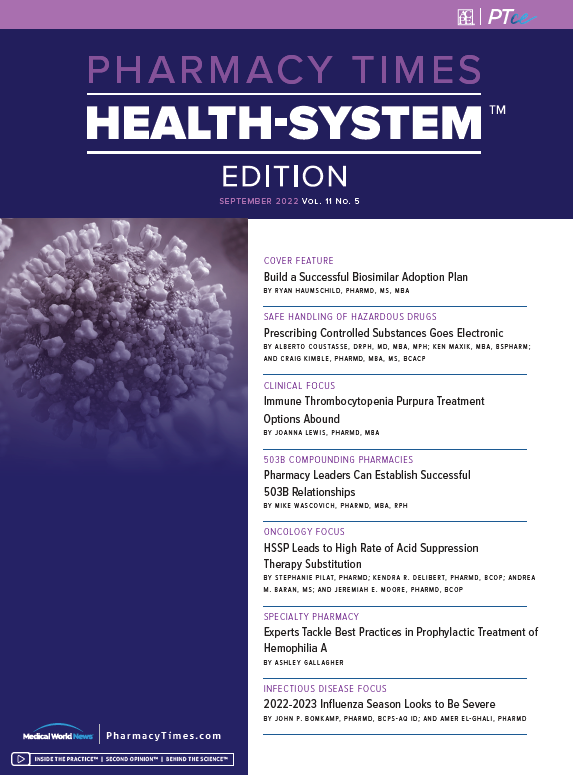Pharmacy Leaders Can Establish Successful 503B Relationships
Key questions to ask when deciding whether compounding facilities are the right fit.
The continuing battle against COVID-19 has strained the health care system and workforce like never before. Hospitals are experiencing shortages of pharmacy technicians, with a majority reporting turnover rates of at least 21% in 2021, and nearly 1 in 10 noting they had lost 41% or more of their technicians, according to a recent survey from the American Society of Health System Pharmacists.1
In addition to significant workforce challenges, pharmacists and providers continue to navigate ongoing shortages2 of medications and products that are vital to patient care. Amid this landscape, pharmacy leaders are increasingly turning to outsourced 503B compounding facilities to help address staffing shortfalls, improve efficiency and productivity, and mitigate the impact of continuing drug supply disruptions. However, 503Bs can play an important role in enhancing the pharmacy supply chain, hospitals must choose their 503B facilities wisely.
Here are 4 key questions pharmacy leaders should ask when deciding whether a 503B is right for them:
1. Can I off-load work and rely on a 503B partner to deliver high-quality products on time? With the strain on virtually all hospital staff members, moving certain work off the hospital campus can make sense for pharmacy leaders. 503B partners can quickly assist by off-loading routine compounded sterile product (CSP) volume at their off-site locations and working closely with hospital leadership to coordinate delivery to various facilities as needed. This removes some of the predictable hospital pharmacy clean-room workload, increasing efficiencies and freeing up staff to focus on the most pressing tasks.
2. Do they offer the products I need at a competitive price? A key benefit to 503B outsourcing facilities is that they produce medications found on the FDA’s drug shortage list. By working with active pharmaceutical ingredients and raw materials with a Current Good Manufacturing Practice (cGMP) standard, patients and providers have access to drugs that would otherwise be unavailable. Addition-ally, providers should seek a 503B supplier to assist them with only the truly laborious CSPs to produce, including controlled substances and narcotics, high-risk compounds, and infrequently used medications. 503Bs produce difficult to-handle medications under a highly repeat-able process, with a high degree of certainty and quality. The operational capacity and automation capabilities can drive efficiencies, lowering cost and waste while offering providers more ready-to-use products.
3. Should I select more than one 503B partner? If so, how many? Pharmacy leaders should review CSP needs and aim to select more than one 503B partner to meet their unique product and volume demands. This supply chain diversification strategy helps mitigate overreliance on any 1 supplier, should they encounter a disruption in service, and it allows for more competitive pricing, creating a healthier market. Doing so protects providers from having all their eggs in 1 basket and helps advance patient care.
4. What is their compliance and inspection record with the FDA, among other regulatory bodies? Section 503B of the Drug Quality and Security Act aims to establish federal standards for product integrity, quality assurance testing, reporting, and safety when producing large volumes of CSPs. 503B suppliers must comply with cGMP requirements, pass FDA inspection according to a risk based schedule, meet other certain conditions, report adverse events, and provide the FDA with specific information about the products they compound. When selecting a 503B partner, purchasers should consider obtaining drugs from FDA-registered compounders and look for a consistent record of satisfactory FDA inspections for assurance that facility operations meet applicable cGMP standards and that the compounded drugs are labeled with the required information.
Upon selection of a 503B partner, pharmacy leaders should consider the following:
•Ask staff members to share concerns and feedback directly and transparently with pharmacy leadership.
•Collaborate with the 503B partner on ongoing program monitoring and measurement.
•Commit to purchase certain volumes of needed drugs to help mitigate reflexive purchasing and manage demand.
•Look at product needs across the enterprise, including in physician clinics and other off-campus locations.
•Share product data with the new supplier about current and future utilization needs.
As the partnership matures, pharmacy teams should conduct regular business reviews with 503B suppliers to review sales information and volume for assurance that both are meeting commitments and maintaining high service levels. Pharmacy teams can also work with trusted 503B partners to refine medication lists or codevelop new product formulations for cost savings and the highest patient benefits.
Pharmacy leaders are looking for effective and, in some cases, alternative solutions to help optimize scarce resources and build long-term resiliency. With the tips outlined above, pharmacy teams are well positioned to establish and sustain successful relationships with 503B suppliers to support their goals.
References
1. Hospitals and health systems experiencing severe shortage of pharmacy technicians. News release. American Society of Health-System Pharmacists; March 15, 2022. Accessed July 7, 2022. https://www.ashp.org/news/2022/03/15/hospitals-and health-systems-experiencing-severe-shortage-of pharmacy-technicians?loginreturnUrl=SSOCheckOnly
2. Fluid shortages: current challenges in accessing a staple supply. Premier, Inc. April 18, 2022. Accessed July 7, 2022. https://premierinc.com/newsroom/blog/fluid-shortages-current-challenges-in-accessing-a-staple-supply
About the Author
Mike Wascovich, PHARMD, MBA, RPH, is vice president of field pharmacy services at Premier, Inc, in Charlotte, North Carolina.

